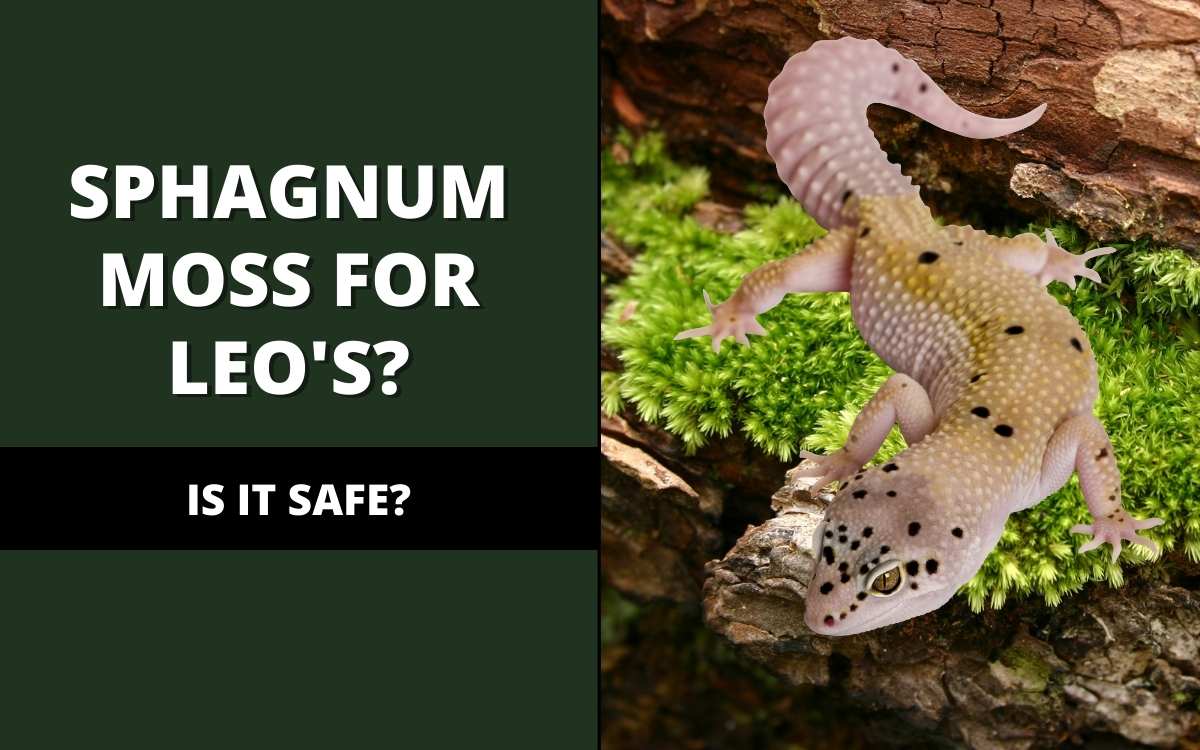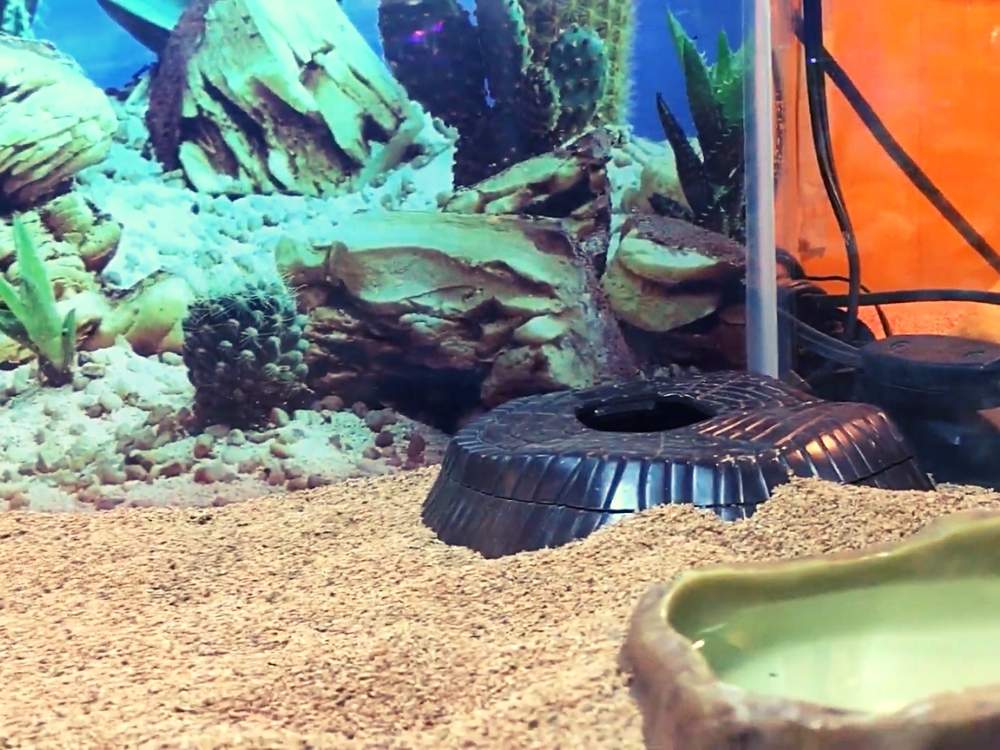Disclaimer: As an Amazon Associate I earn from qualifying purchases. Therefore, we may collect a share of sales from the links on this page, at no extra cost to you!

Hmm.. Sphagnum moss for Leopard geckos? Is it safe? What are its benefits? This is a question that many Leopard gecko parents would love to find an answer to.
Besides, Sphagnum moss is one of the less commonly used substrates in vivariums, so it is good to know whether it is safe for your Leopard gecko.
So, let’s get back to our main question — Should you use Sphagnum moss for Leopard Geckos? Is it a good idea or not?
Sphagnum moss is relatively safe for Leopard geckos when used as a substrate. However, it does pose a small risk of impaction when ingested regularly or in large amounts. Although, if used solely in your leopard geckos’ humid hide, Sphagnum moss has many benefits such as inhibiting the growth of bacteria and assisting with shedding.
Now that you know a little more about Sphagnum moss, let’s explore some of its benefits.
Note: If you’re simply looking for the safest and most beneficial Sphagnum moss for leopard geckos, you can check out our recommendation by clicking here!
Jump to..
Reasons Why Sphagnum Moss Is Used In Leopard Gecko Vivariums

Good Moisture Holding Capacity
- Leopard geckos need a moist environment for them to thrive, and that is exactly what Sphagnum moss offers. This type of moss can retain moisture more easily for a longer duration.
- It can particularly prove helpful when your Leopard gecko is shedding its old skin. With the right moisture content, your gecko won’t have any problem during this process.
Antibacterial Qualities
- Sphagnum moss is known to have some antibacterial properties, meaning it can inhibit the growth of bacteria in gecko vivariums.
- This is a nice benefit since it will require less work cleaning your vivarium and will lessen the likelihood of your leopard gecko developing an illness.
- In addition, if your enclosure tends to smell bad due to your leopard gecko’s pooping, the Sphagnum moss tends to absorb the odor.
Many Leopard Geckos Love It
- Every leopard gecko is different. However, many people have reported that their leopard gecko prefers Sphagnum moss over more traditional substrates.
- Furthermore, because it retains moisture so easily, it works great as a humid hide for your leopard gecko.
It Can Be Used As a Nest
- Of course, this only applies to reptile owners that are planning to breed their leopard geckos. However, if that applies to you, Sphagnum moss makes for an excellent nest.
- As a matter of fact, leopard geckos prefer to dig to lay their eggs. Sphagnum moss is very loose and easy for them to dig through. It’s basically the perfect substrate to use for egg-laying.
If you’re interested in picking up some Sphagnum moss, this is by far the best and safest option for Leopard geckos that I’ve found:
In addition to this, you should check your leo for any signs of impaction before it is too late. If you are not in a position to help, you should consider taking your Leopard gecko to a vet.
Now let’s talk about some of the reasons why your leopard gecko may ingest moss and then we’ll discuss how to avoid it!
Why Is My Leopard Gecko Eating Sphagnum Moss?
According to expert gecko keepers, Leopard geckos eat Sphagnum moss due to two main reasons.
Nevertheless, the reason may vary from one lizard to another, so ensure that you examine your gecko to find the true cause of the moss-eating behavior.
In some cases, however, Leopard geckos have no reason for eating moss since it happens accidentally. This can occur when the gecko is eating its food inside the enclosure.
Although, if there are loose moss substrates around the food, chances are your Leopard gecko will eat them along with the food.
Furthermore, leopard geckos can ingest moss accidentally when they are shedding. This is because they tend to eat the old skin as it peels from their bodies.
Accidental ingestions may not cause serious health problems, provided that the gecko does not eat the moss in large amounts.
Here are some of the common reasons why Leopard Geckos eat moss;
#1. Parasite Infestation
There is no clear reason as to why Leopard geckos eat moss when they have intestinal parasites.
However, most gecko keepers have observed that their pets engage in this behavior when they have a large number of parasites.
The only way to know if your Leopard gecko has parasites is by taking them to the vet for fecal tests.
Hence, for your safety and that of your family, ensure that you clean your hands properly after handling the lizard as this prevents the transmission of parasites.
#2. Nutritional Deficiencies
Needless to say, leopard geckos need a balanced diet that is inclusive of nutrient-rich foods.
If they don’t get whatever they need in the food that you are feeding them, they may resort to eating other things that are in the vivarium, including Sphagnum moss.
Keep in mind, the amount of moss consumed in each feeding session may vary depending on the level of deficiency and how hungry the Leopard gecko is.
How To Prevent Your Leopard Gecko From Eating Sphagnum Moss
Now that you know some of the reasons why your lizard friend is eating moss, you won’t have a hard time applying the right countermeasure to stop the behavior.
To help you out, below are some helpful suggestions that you use;
Feed Your Leopard Gecko Outside Its Vivarium
- If you don’t want your leopard gecko accidentally consuming Sphagnum moss while eating, simply take your leopard gecko outside its enclosure to feed it.
- Alternatively, you can get an escape-proof food bowl to ensure your leopard gecko is eating out of a bowl rather than directly on the moss.
Don’t Cover The Entire Enclosure in Sphagnum Moss
- Due to its high humidity and moisture content, many leopard gecko owners opt to putting the Spaghnum moss only in the cool hide of their enclosure. This will give your leopard gecko the option of resting in the moss and aiding in the shedding process.
Provide a Balanced Diet
- A hungry leopard gecko will be more likely to consume Sphagnum moss.
- Therefore, ensure that your gecko is not only well-fed but also gets all the nutrients that it needs. That way, the little guy will be less likely to eat the moss substrate that is inside the vivarium.
Keep Parasites At Bay
- You can treat intestinal parasitism in Leopard geckos by using anthelmintic drugs. Ensure that you get the prescription from a certified vet to avoid unnecessary complications during treatment.
- Also, you should consider cleaning the vivarium regularly for hygienic purposes.
Alternative Substrates for Your Leopard Gecko
If you notice that Sphagnum moss is affecting the health of your Leopard gecko in one way or another (or they’re constantly digesting it), you should consider replacing it with a alternative substrate.
As stated earlier, there is a wide range of options that you can choose from, so ensure that you go for a substrate that is good for your pet. You can consider:
Reptile Carpets
Reptile carpets can make good substrates for Leopard geckos. They are absorbent, thus allowing for easy maintenance. Furthermore, they come in many different colors and can provide a natural look to your enclosure.
Paper Towels
Paper towels are not only easy to clean but equally cheap. But most importantly, they are super absorbent, making them an ideal option for Leopard geckos.
Although, the only downsides to using paper towel is the fact that you constantly have to change it out and it isn’t very visually appealing.
Ceramic Tiles
If you are after durability, you should consider using ceramic tiles. They are very easy to clean and can be found just about anywhere. Needless to say, you can find them in just about every color. Therefore, you can give your leopard gecko’s enclosure what ever vibe you prefer!
Final Verdict - Is Sphagnum Moss a Good Substrate For Leopard Geckos?
Sphagnum moss is a safe substrate for Leopard geckos, but it should never be ingested as it can cause impaction.
A Leopard gecko may be prompted to eat moss when they suffering from nutritional deficiencies or a parasite infestation.
However, not all Leopard geckos will eat moss, so if it is not affecting your lizard friend in any way, you should continue using it due to its antibacterial properties and good moisture-holding abilities!
We hope you learned something new in this article. As always, stay safe – and Happy Herping!
